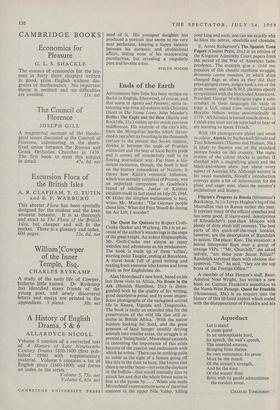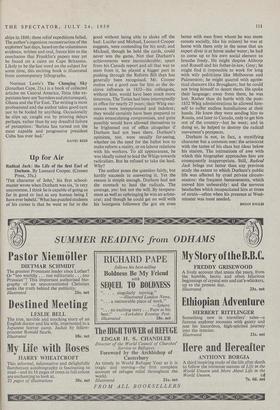Ends of the Earth
ASTONISHING how little has been written on Berlin in English. Isherwood, of course, and that scene in Agents and Patients; some in- teresting war-time adventures with Christian Diestl in The Young Lions. John Mander's Berlin : The Eagle and the Bear (Barrie and Rockliffe, 21s.) makes up for much previous indifference. His analysis of the city's life, from the Mongolian hordes which threat- ened it just after its founding in the thirteenth century to the present day Soviet menace, divides it between the eagle of Prussian militai ism and the bear of local Berlin pride and it comes off wonderfully well in its flowing journalistic way. Far from a his- t°, ical recitation, though, the book is best on the literary antecedents of Nazism; it shows how Kleist's romantic influence, which was actually untypical of Prussia, was an important component in Goebbels's brand of nihilism. Junker or Kantian idealism made its last stand on July 20, 1944. Of Hitler the simplest explanation is best, writes Mr. Mander: 'The German people chose him.' What did Fritz Wendl do during the Air Lift, I wonder?
The Quest for Quixote by Rupert Croft- Cooke (Seeker and Warburg, 18s.) is an ac- count of the author's wanderings in the steps of the great knight. An ardent Hispanophile, Mr. Croft-Cooke met almost as many weirdies and adventures as his predecessor. The book is made up of three 'sallies', starting point Tangier, ending at Barcelona. A travel book full of good writing and reading from someone who knows and loves Spain as few Englishmen do.
Alan Moorehead's new book, based on his last three visits to Africa, No Room in the Ark (Hamish Hamilton, 21s.) is distin- guished both by the quality of his writing, good descriptive prose, and by some magni- ficent photographs of the variegated animal life in Kenya, Uganda and Tanganyika. The book is really an extended plea for the preservation of the wild life that still re- mains in British Africa. With the native hunters looking for food, and the great pressure of land hunger steadily driving animals into smaller areas, the struggle is at present a 'losing battle'. Moorehead succeeds in conveying the importance of this crisis because of the passion and enthusiasm with which he writes: 'There can be nothing quite so noble as the sight of a lioness going off like this in the dusk to hunt. She knows that there is no other beast—not even the elephant or the buffalo—that would normally dare to attack her and that the whole forest waits in fear as she passes by . . .' When one reads Moorehead's comments on some of thetribal customs in the upper Nile Valley, killing
your king and such, one can see exactly why he likes his zebras, shoebills and cheetahs.
E. Arnot Robertson's The Spanish Town Papers (Cresset Press, 21s.) is an edition of the Kingston Admiralty Court papers from the period of the War of American Inde- pendence. The excerpts give a vivid im- pression of this chaotic maritime struggle, Britannia contra tnundum, in which ships changed flags as often as they did their press-ganged crews, judges took a cut of the prize money, and the B.W.I. planters openly sympathised with the blockaded Americans. President George Washington signs a safe- conduct in three languages (in vain) to keep a U.S. vessel from seizure; Captain Horatio Nelson writes pessimistically in 1779: 'All Jamaica is turned upside down ... I think you must not be surprised to hear of my learning to speak French.'
With 194 photogravure plates and seven in colour, Austria by Sacheverell Sitwell and Toni Schneiders (Thames and Hudson, 50s.) is likely to become one of the standard picture books on this country. The regis- tration of the colour blocks is perfect (I checked with a magnifying glass) and the black-and-whites show just about every aspect of Austrian life. Although written in his usual mandarin, Sitwell's introduction conveys quite a lot of information for the plain and eager man about the country's architecture and history.
Pilgrim's Progress in Russia (Housman's Bookshop, 5s.) is Emrys Hughes's log of the Macmillan visit to Russia earlier this year. It reprints many of the official speeches and has some good, if starry-eyed, descriptions of Khrushchev's post-thaw Moscow with plenty of dirty slush still unswept. The best parts of this quick-off-the-mark booklet, however, are the descriptions of Randolph in action. The place: Kiev. The situation: a Soviet interpreter flaps over a group of strange VIPs. "Mr. Churchill," she asked naively, "are these your Secret Police?" Randolph surveyed them with obvious dis- approval, "No," he said, "they are the top brass of the Foreign Office."'
A member of Max Horton's staff, Rear- Admiral Noel Wright, has written a new book on Captain Franklin's expedition to the North-West Passage. Quest for Franklin (Heinemann, 25s.) is an enquiry into the history of this ill-fated exploit which ended with the disappearance of Franklin and his ships in 1848; three relief expeditions failed. The author's ingenious reconstruction of the explorers' last days, based on the voluminous evidence, written and oral, forces him to the conclusion that Franklin's papers may yet be found on a cairn on Cape Britannia. Likely to be the last word on the subject for some time, this exciting book is illustrated from contemporary lithographs.
Norman Lewis's The Changing Sky (Jonathan Cape, 21s.) is a book of collected articles on Central America, Ibiza (the ex- patriates here are 'harmless and picturesque), Ghana and the Far East. The writing is most professional and the author takes good care not to be fooled by anything. Occasionally he slips up, caught out by printing delays perhaps, rather than by any dreadful failure of perception: 'Batista has turned out the most capable and progressive president Cuba has ever had.'
DAVID REES







































 Previous page
Previous page